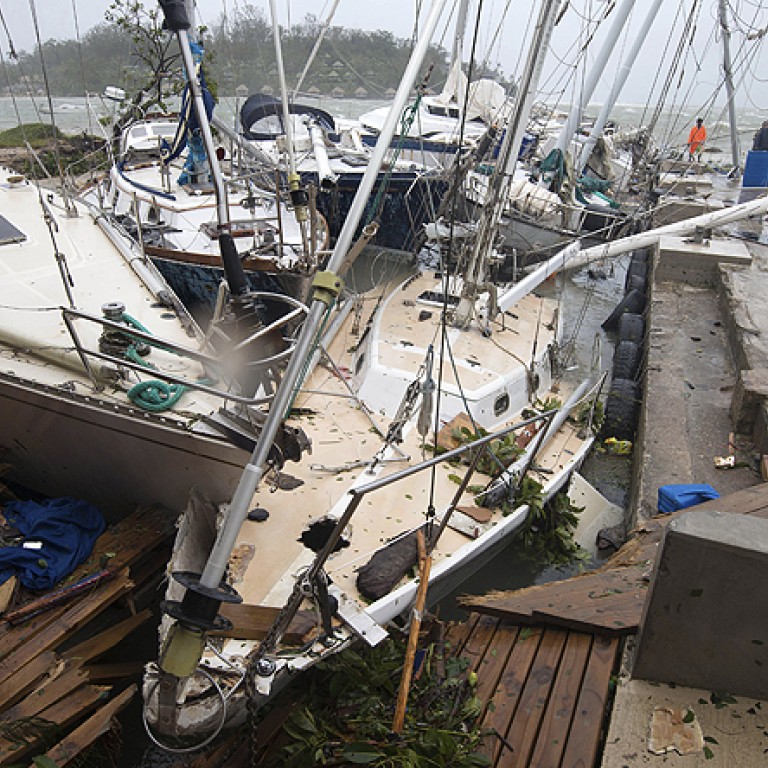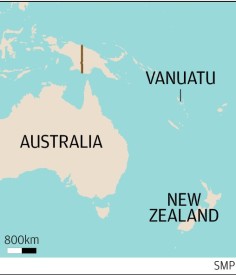
Update | Huge cyclone in Pacific devastates Vanuatu
A terrifying tropical cyclone which smashed into Vanuatu in the South Pacific wreaked widespread devastation, raising fears that dozens might have died in what could be one of the region's worst weather disasters.
A terrifying tropical cyclone which smashed into Vanuatu in the South Pacific wreaked widespread devastation, aid agencies said yesterday, raising fears that dozens might have died in what could be one of the region's worst weather disasters.

The United Nations had unconfirmed reports of 44 people killed in one province, and said late yesterday that there was no clear number of deaths or injuries but that the impact of the cyclone had been "catastrophic".
"A disaster of this magnitude has not been experienced by Vanuatu in recent history - particularly in terms of the reach of the potential damage and the ferocity of the storm," said Sune Gudnitz, who heads the UN Office for the Coordination of Humanitarian Affairs in the Pacific.
Aid agencies were preparing to send teams to Vanuatu. "While it is too early to say for certain, early reports are indicating that this weather disaster could potentially be one of the worst in Pacific history," Unicef New Zealand's executive director Vivien Maidaborn said.
Vanuatu's President Baldwin Lonsdale led appeals for international assistance, telling those a UN conference on disaster risk reduction that he spoke with a "heart that is so heavy".
"I stand to appeal on behalf of the government and people of Vanuatu to the global community to give a lending hand in responding to these very current calamities that have struck us," Lonsdale told the conference in Sendai, Japan.
Aurelia Balpe, head of the Pacific regional office of the International Federation of Red Cross and Red Crescent Societies, said there were unconfirmed reports of casualties in the capital, Port Vila. But they had greater fears for outlying southern islands, home to more than 33,000 people, where communication had been severed completely.
"We are starting to get a picture from Port Vila, but there's nothing from the south," she said from Suva. "We are very worried just because there are less permanent structures in that part of the country."
Residents of Port Vila spent the night hunkering down as the terrifying storm raged, waking to find homes destroyed and areas flooded. "The scene here this morning is complete devastation - houses are destroyed, trees are down, roads are blocked and people are wandering the streets looking for help," said Save the Children's Tom Skirrow.
Unicef's Alice Clements described the cyclone as "15-30 minutes of absolute terror".
UN holds disaster risk reduction conference
Policymakers gathered for a 10-yearly meeting on disaster risk reduction yesterday, with hopes high that the conference in tsunami-hit Japan might provide a springboard for efforts to tackle natural disasters and costly climate change.
UN Secretary General Ban Ki-moon said he had met the president of Vanuatu, which was being battered by a devastating cyclone, and conveyed "our deepest condolences" as well as solidarity with the people of the archipelago. "What we are discussing here today is very real for millions of people in the world," he said in his address in Sendai.
Ban, who has highlighted the rise in extreme weather as global warming accelerated over the past decade, added: "Disaster risk reduction is a frontline defence against the impacts of climate change. It is a smart investment for business and a wise investment in saving lives."
A report by the UN Office for Disaster Risk Reduction said global economic losses from disasters cost an average of US$250 billion to US$300 billion annually.
"Two-thirds of natural disasters come from climate change," French Foreign Minister Laurent Fabius said ahead of his attendance in the five-day conference. Fabius is president of the COP 21 conference on climate change, which will be held in Paris in December.
"A success in Sendai may prefigure that of Paris," he said, adding he wanted to draw up a scheme in which all territories and vulnerable populations had an early warning system for disasters.
In a conference speech, Fabius said more than 70 countries were identified as particularly vulnerable and exposed to "extreme weather events".
